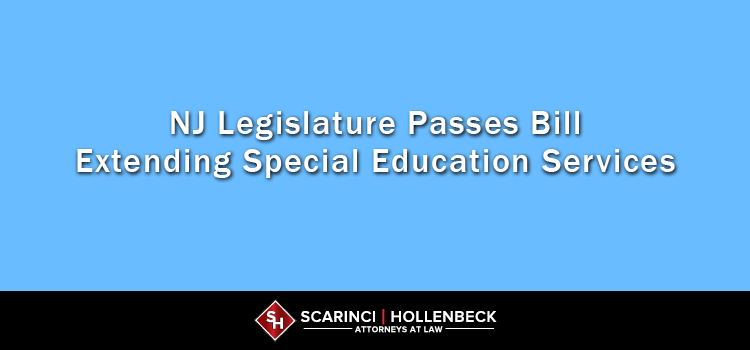
New Jersey recently passed legislation that requires boards of education to extend special education and related services for certain students exceeding age of eligibility.…
The New Jersey Legislature recently passed legislation that requires boards of education to extend special education and related services for certain students exceeding age of eligibility. The bill, A-5366/S-3434, reflects concerns that special education students aging out of special education also have lost a year of learning in light of the COVID-19 pandemic.
Aging Out of Special Education Services
Under existing New Jersey Board of Education regulations, boards of education are required to provide a free, appropriate public education, in accordance with an individualized education program (IEP), to students with disabilities age three through 21. When a student turns 21 years of age during the school year, defined as the period between July 1 and June 30, the student is entitled to finish the school year. After June 30 of the student’s final school year, the school district is no longer responsible for providing special education students special education and related services. This is often referred to as “aging out.”
Legislation Extends Special Education Eligibility Due to Pandemic
Assembly Bill 5366/Senate Bill 3434 would require boards of education to convene IEP meetings to determine if students aging out of special education require additional or compensatory special education and related services due to the pandemic. The extension shall be effective for students aging out in the 2020-2021, 2021-2022, or 2022-2023 school years only.
More specifically, students attaining the age of 21 during the 2020-2021 school year would be eligible for special education and related services in the 2021-2022 school year; students attaining the age of 21 during the 2021-2022 school year would be eligible for special education and related services in the 2022-2023 school year. and students attaining the age of 21 in the 2022-2023 school year would be eligible for special education and related services in the 2023-2024 school year. Unless otherwise provided in the student’s IEP or as ordered by a hearing officer, complaint investigation, or court of competent jurisdiction, a student would not be eligible to receive special education and related services beyond the school year in which he or she attains the age of 22.
The legislation provides that students receiving special education and related services, including transition services, will be afforded the same rights, privileges, and remedies provided to students with disabilities pursuant to State law, State Board of Education regulations concerning special education, and the federal Individuals with Disabilities Education Act (IDEA). Any disputes that arise with respect to the provision or nature of services provided to a student with disabilities in the additional year may be addressed, as determined by the parent of the student, by either: mediation; a written request for a complaint investigation submitted to the Director of the Office of Special Education Policy and Dispute Resolution in the Department of Education; or a special education due process hearing pursuant to the provisions of applicable federal and State law.
Under A-5366/S-3434, the special education and related services, including transition services, provided under the bill, to the extent permitted by federal law, will be paid for from the monies received by the State or a school district under the federal Coronavirus Aid, Relief, and Economic Security (CARES) Act, the federal Coronavirus Response and Relief Supplemental Appropriations (CRRSA) Act, 2021, the federal American Rescue Plan (ARP) Act, or any other federal funding provided to address the impact of the coronavirus pandemic on elementary and secondary schools as it becomes available. To the extent that these federal funds don’t cover the costs borne by school districts, the bill requires the State to appropriate funds as necessary from the Property Tax Relief Fund to reimburse school districts.
Finally, the legislation also provides that the Department of Education (DOE) will permit an approved private school for students with disabilities to temporarily utilize non-qualifying spaces on school property for instruction and educational purposes in order to serve any additional students receiving special education and related services, including transition services, under the bill, if the department and the applicable county office of education determine that the school is able to provide suitable accommodations in those spaces for the additional students. The bill further provides that the DOE will, for the 2021-2022 school year through the 2025-2026 school year, set the maximum tentative tuition rate of each approved private school for students with disabilities at the maximum tentative tuition rate set for the 2020-2021 school year if, during the 2021-2022 school year through the 2023-2024 school year, the school exceeds the total number of students at the approved facility in the 2020-2021 school year.
What’s Next?
The legislation now heads to Gov. Phil Murphy. If signed into law, it would take effect immediately. If you have legal concerns related to the proposed legislation and how it may impact your school district, we encourage you to contact a member of Scarinci Hollenbeck’s Education Law Group at 201-896-4100.
